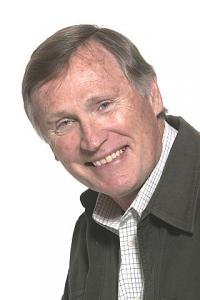Following on the success of the documentary film, "The Singing Revolution," the film's directors, James and Maureen Tusty, have worked over the past year with Estonian-American journalist Priit Vesilind to put the film ideas and emotions into book form, as a companion piece for the film. This April the book will be introduced to the public in Toronto with a book signing that will accompany a special Toronto screening of the film, at the Ontario Place Cinesphere on Sunday, April 20 at 5 pm. The documentary had its North American premiere in Toronto as the gala presentation of the estdocs film festival in the fall of 2007.
"The Singing Revolution" book is a 200-page volume written by Vesilind, with contributions from the Tustys, and includes some 70 high-definition frames from the film itself, as well as photographs from Vesilind's extensive collection of historical slides from Estonia.
Vesilind, 65, a retired but still active writer and editor at National Geographic magazine in Washington, D.C. has written seven major articles about the Baltic Sea area, including the first Western-reported magazine piece from Soviet-occupied Estonia in 1980, "Return to Estonia," which was translated by Voice of America and passed around Estonia in samizdat version after its appearance.
For the Singing Revolution book Vesilind took the framework and concepts of the documentary film and merged it with other research and past experiences to produce a book that is amply illustrated and goes deeper into the background, causes, and music of Estonia that led to the "Singing Revolution." It will be published by Varrak Kirjandus in Tallinn, one of Estonia's major book publishers, in both English and Estonian languages.
"This is a book that every Estonian in North America has needed at one time or another," Vesilind says. "Many of our American friends know next to nothing about Estonia, and there has been a dearth of books in English about Estonian history and culture." The book is written especially for this audience, he says. It is not academically oriented, easy to read, and richly illustrated, much like National Geographic itself. "You can hand this book to a friend," Vesilind says, "and say to him, 'This is what we're all about.'"
Priit Vesilind to sign his new book Singing Revolution in Toronto (3)
Archived Articles | 15 Apr 2008 | EWR
Viimased kommentaarid
Kommentaarid on kirjutatud EWR lugejate poolt. Nende sisu ei pruugi ühtida EWR toimetuse seisukohtadega.
Vesilind makes a good point in that many Estonians wished they had been full-blooded Estonians, but they couldn't escape the truth that Estonians who lived in the territorial space of Estonia (otherwise known as the Estonian Soviet Socialist Republic) have always had a greater moral claim to the rights of being fully-fledged Estonians. Estonians abroad were merely a half-way house, trying their best in forging a better deal for their brothers back home. Many couldn't stay the distance because of political qualms about the nature of Soviet Estonia. In the end the children borne out of the hard won battle for freedom won their share, and have given democracy their best shot in spite of shortcomings of their own making. If the strength of building a new Estonia were left to the whims of Estonians living abroad, then it is highly probable that Estonia as a state wouldn't be in existence anymore, since most Estonians abroad prefer not to live in Estonia, but do for some strange reason like to call themselves Estonian. It just doesn't add up, but then again we're not talking about the State of Israel, are we.
The Pittsburgh Post-Gazette ran a story on Mr. Vesilind (http://www.post-gazette.com/pg.... I find this passage very disturbing, almost critical of Estonians abroad during the Soviet era:
Mr. Vesilind said he knows many native Estonians who settled in big cities, and he thinks he was better off. "So many of my father's friends felt that they had to stay ethnic Estonians," something they could do in the anonymity of New York or Chicago with other Estonians around them. "It was like they had one foot in America, but they never really put the other foot down. They were sort of living half-lives."
I'm sorry Mr. Vesilind, but my family was one of those who "had one foot in [North] America" but "never really put the other foot down." I'm grateful to them for doing so, and raising me in the most Estonian household tradition they could.
Mr. Vesilind said he knows many native Estonians who settled in big cities, and he thinks he was better off. "So many of my father's friends felt that they had to stay ethnic Estonians," something they could do in the anonymity of New York or Chicago with other Estonians around them. "It was like they had one foot in America, but they never really put the other foot down. They were sort of living half-lives."
I'm sorry Mr. Vesilind, but my family was one of those who "had one foot in [North] America" but "never really put the other foot down." I'm grateful to them for doing so, and raising me in the most Estonian household tradition they could.
What is the cost of the book?
Archived Articles
TRENDING





















